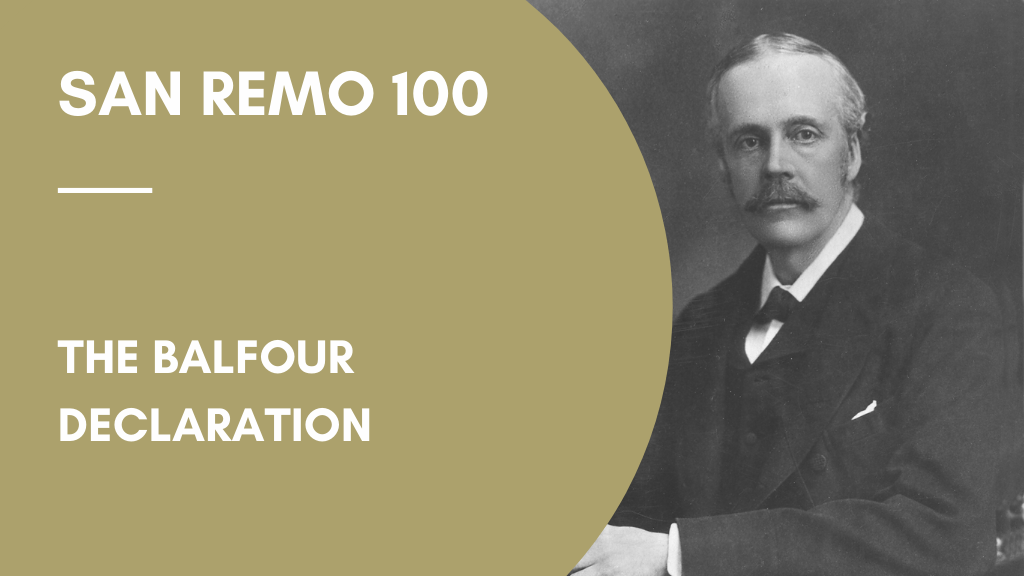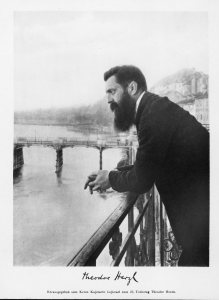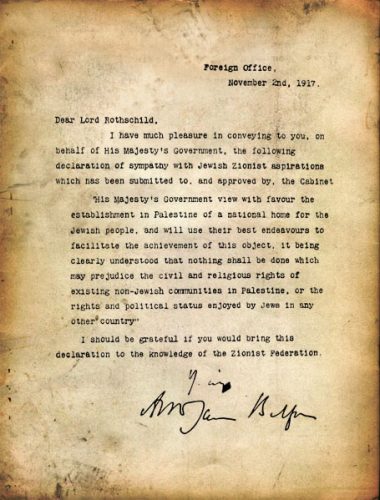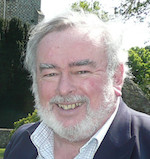The Balfour Declaration – San Remo 100 (part 1)
25th April this year will mark the centenary of the San Remo Resolution of 1920. Not many people around the world – even Jewish people, including those who live in Israel – know much about the San Remo Resolution, or have even heard of it. So why is it so important?
From Vision to International Law
Chaim Weizmann, who would later become the first President of the State of Israel, addressing the annual Zionist conference in July 1920 said: “This is the most momentous political event in the whole history of our movement and it is perhaps no exaggeration to say in the whole history of our people since the exile.” 1
Across the Atlantic the Zionist Organisation of America declared: “that the decision of the Supreme Council of the Principal Allied Powers” – in other words the San Remo Resolution – “crowned the British declaration” – which is, of course, the Balfour Declaration – “by enacting it as part of the Law of Nations of the world.” 2
The San Remo Resolution was not an isolated event. There was a back-story, or series of events that led to it, and there were earth-changing events that resulted from it that still have ramifications a century later. This is the first of a series of six articles that centres on the San Remo Resolution.
The San Remo Resolution of April 1920, in many respects, is even more significant to the Jewish people than the Balfour Declaration of November 1917. The Balfour Declaration, in legal terms, was nothing more than a statement of government policy. The San Remo Resolution and the Mandate for Palestine that resulted from it, both of which encapsulated the Balfour Declaration, raised it to the legal status of an international treaty.
The Biblical Title Deed to the Land of Israel Enshrined in International Law
Most Christians who share God’s love for Israel and the Jewish people know that the title deed to the land of Israel as belonging to the descendants of Abraham, Isaac and Jacob forever is mentioned many times in the Hebrew Bible. The best example is found in Genesis chapter 15, where the Lord entered into an unconditional covenant with Abraham, especially regarding the Land that became known as Israel. At San Remo in 1920 the Lord did a remarkable thing. He enshrined that ancient ‘title deed’ into international law in the modern era.
“At San Remo in 1920 the Lord did a remarkable thing. He enshrined Israel’s ancient ‘title deed’ to the Land into international law in the modern era.”
Theodor Herzl’s Vision for a Jewish State
The Balfour Declaration was the vital stepping-stone to that happening. However, what became known as the Balfour Declaration was not an isolated event either. We need to rewind to the 1890s when there was a rise in anti-Semitism in Europe. This was epitomised by the Dreyfus Affair in France, when a Jewish army officer, Alfred Dreyfus, was falsely accused of treason because he was Jewish. Among those reporting on the trial was a Jewish Vienna-based journalist. His name was Theodor Herzl. Herzl came to realise that only persecution lay ahead for the Jewish people in Europe, and in 1896 he published a booklet entitled Der Judenstaat – The Jewish State. The following year Herzl organised the First Zionist Congress in Basle, Switzerland, where he predicted there would be a Jewish State within 50 years. In 1900 the Zionist Congress was held in London and Herzl said: “Zionism demands a publicly recognized and legally secured home in Palestine for the Jewish people. This platform, which we drew up three years ago, is unchangeable.” 3
The Christian Vision for a Jewish return to Israel
Alongside Theodor Herzl in his quest to establish a Jewish state in the ancestral home of the Jewish people, was a Christian Anglican minister who was Chaplain to the British Embassy in Vienna. His name was William Hechler, and in many respects he was as ‘Zionist’ as Herzl himself. Hechler was by no means the first ‘Christian Zionist’. In Britain the expectation of the restoration of the Jewish people to their ancient Promised Land had started with the Puritans in the 17th century, followed by the evangelical revivalists of the 18th and 19th centuries. Almost every Christian leader one could name from that era – among them the Wesley brothers, William Wilberforce, Charles Simeon, Robert Murray M’Cheyne, Lord Shaftesbury, Bishop J C Ryle and CH Spurgeon – held this belief. Christians in those days were looking to and longing for the Second Coming of our Lord Jesus Christ with a passion that is rarely seen in the church today. They also understood from the Bible that before the Lord could return, the Jewish people had to return to the Land of Israel, and they began to pray for that restoration in anticipation of the Lord’s return. I believe that the Balfour Declaration was God’s answer to those prayers that were entirely in line with His purposes.
The Balfour Declaration – the Sovereign Hand of God?
These days most non-Christians (and, sadly, many who call themselves Christians too) would describe such belief as fanaticism, even criminal. They would blame the Balfour Declaration on nothing more than British imperialism. To be sure, British geo-political interests did play a part in the issuing of the Balfour Declaration. The God of Abraham, Isaac and Jacob used that too!
At the time the members of the War Cabinet sat down in Whitehall on 31st October 1917 to determine the final wording of the statement of policy that became known as the Balfour Declaration, the British government was in no position to implement it. All of Palestine – as it was then known, and beyond – was firmly in the control of the Ottoman Turkish Empire, and they were fiercely opposed to the idea of a Jewish National Home. Unknown to the War Cabinet, at very time they were meeting the Allied forces had captured Beersheba opening the way to the conquest of Jerusalem, and eventually the collapse of the Ottoman Turkish Empire. Was the timing of this crucial victory on the battlefield mere coincidence, or was it the sovereign hand of God? Two days after the War Cabinet meeting, a letter from Foreign Secretary Arthur James Balfour was conveyed to Lord Rothschild. Simultaneously news of the victory at Beersheba reached London. The date was 2nd November 1917.
“In Britain the expectation of the restoration of the Jewish people to their ancient Promised Land had started with the Puritans in the 17th Century, followed by the evangelical revivalists of the 18th and 19th Centuries.”
A Positive Response and a Pledge
A number of church leaders responded favourably to the Balfour Declaration, including three Roman Catholic Bishops and fourteen Anglican Bishops. The then Bishop of Lincoln wrote: “What lover of Holy Scripture and what friend of freedom can help rejoicing at the prospect of the Hebrew people returning to their own land again? God speed them!” 4
Jan Christian Smuts was one of the ten men at that momentous War Cabinet meeting on 31st October 1917. He was also one of the authors of the Covenant of the League of Nations at the Paris Peace Conference in 1919. He said of the Balfour Declaration: “Christians who had received the leadership of the Prince of Peace from the Jewish nation were now in a position to make some small return for those priceless blessings, and to restore Israel to the ancient glorious homeland.” 5
He went on to say that it was: “A debt of honour which must be discharged in full at all costs and in all circumstances.”
Find out more by watching Episode 3 of ‘Whose Land?’
This article is the first in a six-part series exploring the significance of the San Remo Resolution for today. This series was first published Prophecy Today UK and published with permission.
>>Overview of this series
References
1 Opening address by Chaim Weizmann to the Zionist Congress, London, 7 July 1920.
2 Interview with Dr Cynthia Day Wallace, ‘Whose Land? Pt 1’, produced by Hugh Kitson.
3 Address to the Zionist Congress, London, July 1920. Quoted here.
4 Quoted from interview with Dr Paul R Wilkinson (author, ‘Understanding Christian Zionism’) in ‘The Destiny of Britain’, produced by Hugh Kitson.
5 Ibid.
Photo header: Lord Balfour | The Central Zionist Archive




